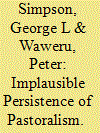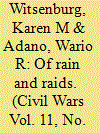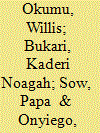|
|
|
Sort Order |
|
|
|
Items / Page
|
|
|
|
|
|
|
| Srl | Item |
| 1 |
ID:
119118


|
|
|
|
|
| Publication |
2013.
|
| Summary/Abstract |
Livestock raiding among northern Kenya's pastoralists has changed profoundly in the last decades. Fought with modern weaponry and often extreme violence, raiding is increasingly enmeshed in politicized claims over administrative boundaries, struggles for exclusive access to land, and attempts to establish or safeguard an ethnically homogeneous electoral base. These conflicts are part of Kenya's troubled politics of decentralization and as such they must be viewed in the context of wider political developments in the country. Based on ethnographic fieldwork in East Pokot and surrounding areas in Kenya's Central Rift Valley Province, this article demonstrates how livestock raiding emerges as a specific form of violent regulation, a well-adapted, dangerous, and powerful political weapon.
|
|
|
|
|
|
|
|
|
|
|
|
|
|
|
|
| 2 |
ID:
178882


|
|
|
|
|
| Summary/Abstract |
Based mainly on archival and oral sources this study examines the history of the cattle-herding Samburu people from the mid-nineteenth century through Kenyan independence in 1963. The authors emphasize the resilience and resourcefulness that the transhumant pastoralists exhibited as they encountered a host of challenges that ranged from epidemics and major outbreaks of disease among their livestock to interethnic competition for scarce resources to a host of disruptions brought on by colonial rule. The allegedly scientific nostrums British administrators sought to impose engendered a host of innovative reactions and ultimately the Samburu succeeded in abolishing the most onerous of these so that they gained their own kind of independence even before Uhuru came to the rest of Kenya. Thus, the Samburu brand of transhumant pastoralism, which colonial officials and other “expert” observers once believed a curious relic that was destined for the dustbin of history, nonetheless persisted into the post-independence era.
|
|
|
|
|
|
|
|
|
|
|
|
|
|
|
|
| 3 |
ID:
103131


|
|
|
|
|
| Publication |
2009.
|
| Summary/Abstract |
In the face of the current focus on climate change, the question whether climate variations have effects on ethnic violence is addressed. This article shows the results of an empirical study on the relationship between violent livestock raiding and climatic conditions. The practice of livestock raiding causes large numbers of casualties in northern Kenya. While conflicts over scarce resources may be largely explained by drought conditions, population pressure, and access problems, livestock raiding is more violent during wet seasons, when pasture and water are abundant and when the livestock is in good health. The higher incidence of violent deaths during wet times hints at opportunistic behaviour of raiders.
|
|
|
|
|
|
|
|
|
|
|
|
|
|
|
|
| 4 |
ID:
155008


|
|
|
|
|
| Summary/Abstract |
This paper argues that livestock raids and pastoralists’ competition over water and pastures in north-western Kenya are manifestations of local ethnic political contests and rivalries. The culture of raiding among the Samburu, Turkana, Pokot, Borana, Gabra and Rendille communities has changed over the last 40 years. Whereas elders were once the gatekeepers of communal institutions, today new actors are at the forefront of new forms of violent raids. Among Samburu and Turkana communities, politicians and shrewd businessmen have emerged to exploit ethnic rivalry that exists between these groups and use it to mobilise raids. These political and business elites play influencing roles in raiding by paying and arming warriors to carry out raids. Competition for political influence is closely intertwined with competition over scarce water resources and grazing pastures among Turkana and Samburu. Given that pastoralists survive on decreasing pasture and water resources, our study shows that political elites arm their communities during the dry season to gain the upper hand in contests over access to limited resources. Livestock raids no longer occur in the traditional context of restocking, but rather as an expression and manifestation of local ethnic politics and political contests between ethnic kingpins. The study uses primary field data from a case study collected through in-depth interviews, oral history and group discussions with various actors.
|
|
|
|
|
|
|
|
|
|
|
|
|
|
|
|
|
|
|
|
|